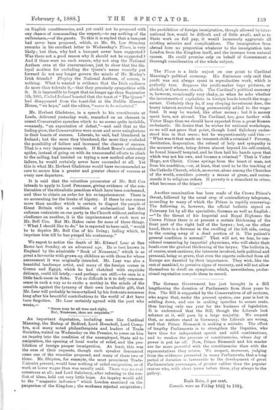The Times is a little unjust on one point to
Cardinal Manning's political economy. His Eminence only said that profit was not always spent in reproductive work, which is perfectly true. Suppose the profit-maker buys pictures, or alcohol, or Cashmere shawls. The Cardinal's political economy is, however, occasionally very shaky, as when he asks whether the investments of capitalists in foreign bonds benefit the wage- earner. Certainly they do, if any sleeping investment does, the heavy interest received being permanently added to the wage- fund. It may be wasted, like other money ; but it is money spent here, not abroad. The Cardinal, too, goes farther with Victor Hugo than we should have expected from a great Roman ecclesiastic. He denies that he wishes for national workshops, so we will not press that point, though Lord Salisbury under- stood him in that sense ; but he unquestionably said this :— "What was it that made an innocent child a criminal ? Poverty, destitution, desperation, the refusal of help and sympathy in the moment when, being driven almost beyond his self-control, he found himself tempted, and he then laid his hands upon that which was not his own, and became a criminal." That is Victor Hugo, not Christ. Crime springs from the heart of man, not from his condition,—or, at least, that used to be the teaching of the Catholic Church, which, moreover, alone among the Churches of the world, considers poverty a means of grace, and recom- mends it to religious orders. If poverty is a stimulant to crime, what becomes of the friars


































 Previous page
Previous page